14 Proven Ways to Use Social Proof in eCommerce (Tips & Examples)
According to the most recent surveys, 92% of consumers read at least one review before buying something online. More striking, 47% of people will only buy products rated above 4 stars. However, despite these statistics, very few businesses have an effective strategy for using Social Proof in eCommerce.
This article will show you:
- 14 proven ways to use Social Proof on eCommerce websites
- Examples of their use in successful eCommerce platforms.
- Scientific studies that prove they work
What is Social Proof
Social Proof is a type of conformity. When a person is unsure how to act, they will often look to others for clues. Because of this, Social Proof is one of the most effective ways for eCommerce websites to build trust.
Surveys and reviews in the last couple of years have confirmed the importance of social proof to eCommerce:
- 95% of 18-35 year olds read reviews before trusting a local business (2018 consumer review, BrightLocal)
- 63% of all customer check Google reviews before visiting a business (2018 internet survey, ReviewTrackers)
- Purchase likelihood with five reviews is 270% higher than with no reviews (2017 customer survey, Spiegel)

14 Ways to Use Social Proof in eCommerce
Adding Social Proof To Your eCommerce Home Page
#1 – Include testimonials on your home page
Applying Social Proof to Product Pages
#2 – Indicate the number of people who bought this product
#3 – Emphasise the users who have endorsed your products
#4 – Frame your products: “number 1”, “best selling”, “fastest growing”
#5 – Display the number of “likes” next to your product
#6 – Recommends similar products: “People also bought…”
#7 – Display customer testimonials under the product
#8 – Display expert reviews for your products’ endorsements
#9 – Indicate how many Facebook friends have purchased or signed up
Social Proof on Category Pages
#10 – Mark your best products as “Popular Choice”
Social Proof in the Search Bar
Social Proof in the Checkout Process
#12 – Re-engage customers after payment
More Specific Elements for eCommerce Websites
#13 – Display contextual details for your reviews
#14 – Add human pictures to your testimonials
Social proof marketing works better in some situations than others. For example, when people are unsure about a decision, they will often copy people who they identify with. To increase the impact of social proof on your eCommerce site, you should try to use reviews that your target customers might relate to.
The simplest and fastest way to add social proof to your website is to use a social proof app. However, each of the techniques in our list can also be achieved by adding the right content to your website.
Social Proof And Consumer Behaviour
Most of the techniques on our list simply apply Social Proof to eCommerce website design. However, some incorporate other psychological principles. Here is a quick summary of the other psychological effects to look out for:
- Base rate fallacy: Base Rate Fallacy occurs when contextual or general information is neglected when analysing more recent information.
- Commitment and Consistency: Once we have publicly committed to something, we are more likely to carry through and deliver on it.
- Mere-exposure Effect: The Mere-exposure Effect is the way a positive reaction can be induced simply from familiarity.
- Self-efficacy Theory: Self-efficacy is a person’s belief in their own competence. Remarkably, this belief is one of best predictors of success or failure.
- Social Cognition: Social Cognition explains the way most people gravitate to things that resemble themselves.
- Social Comparison Theory: Social Comparison Theory describes how individuals evaluate themselves through comparison, rather than absolute terms.
Adding Social Proof To Your eCommerce Home Page
#1 – Include testimonials (with name, logo and face) on your home page
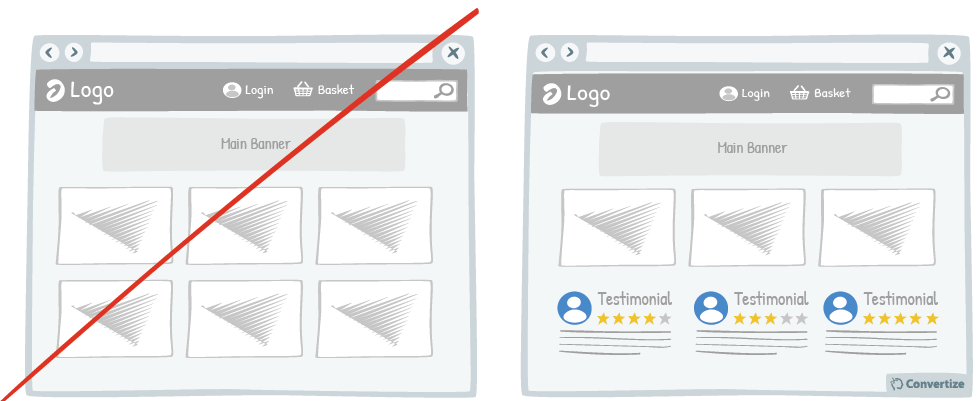
If you have positive reviews about your products or services, it makes sense to display them on your homepage. Scott Dunn displays a carousel of customer reviews that build confidence in their service.

Research has shown that we have a strong tendency to copy others’ choices when we are hesitating. Moreover, seeing that someone else has had a positive experience will give your visitors more confidence to purchase, subscribe or fill in a form.
One of the most widely trusted and used platforms for submitting and displaying customer testimonials is Google My Business. Setting up Google My Business reviews is straightforward, and there are a number of excellent online guides.
Principles
- Social Proof (Sherif, 1935; Asch, 1956)
Using Social Proof on eCommerce Product Pages
#2 – Show the number of people who bought a product
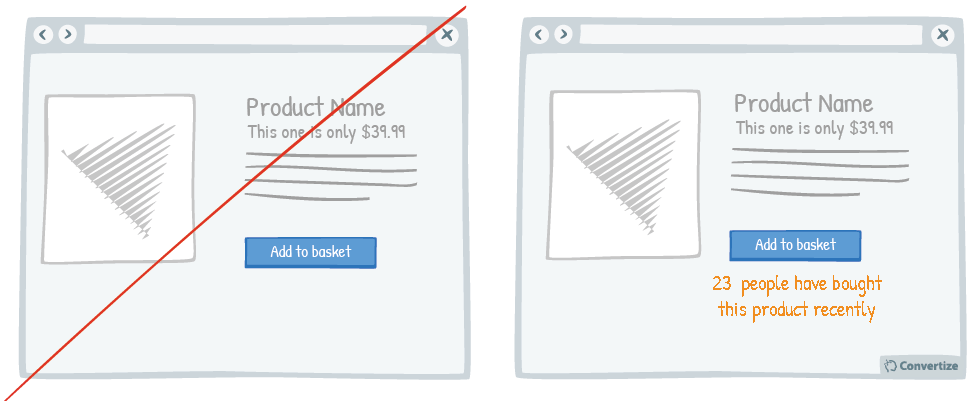
We automatically presume that our peers have a good reason for doing something or buying a particular product. So, if you have a popular product, let potential customers know it!
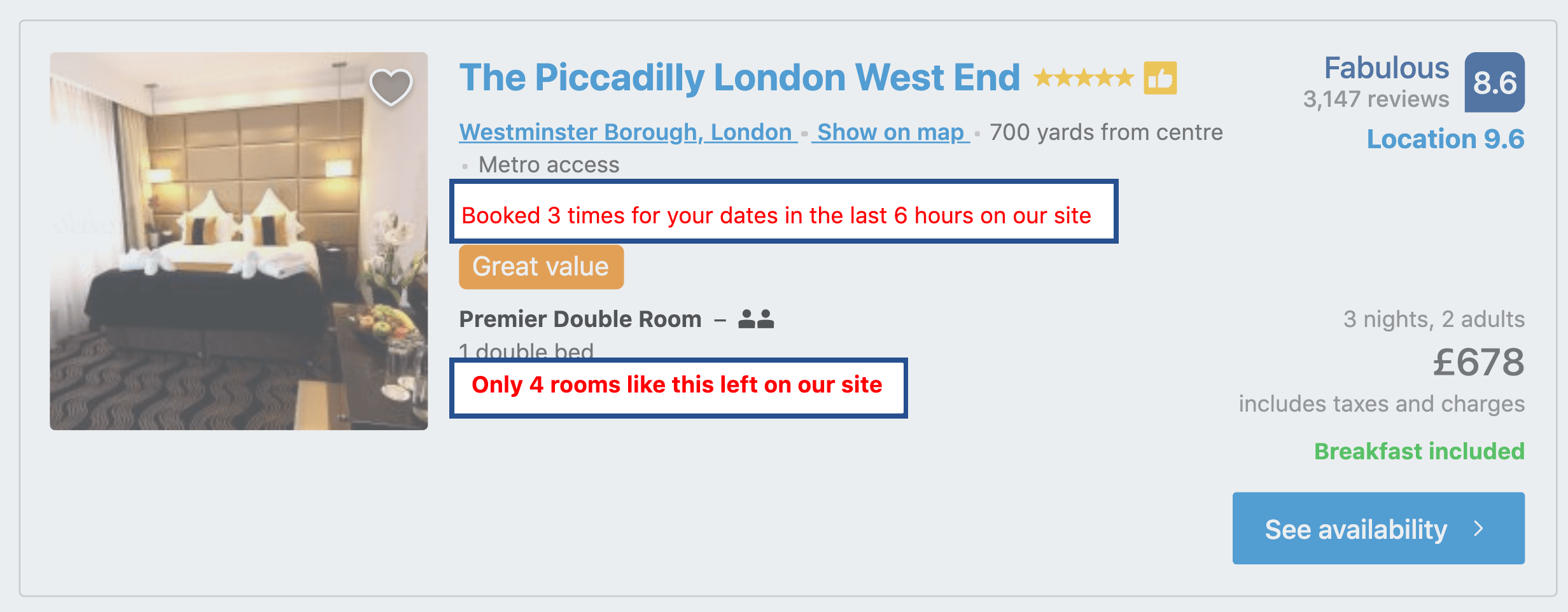
If the number is high, then display how many people have already bought a certain product. Your customer will certainly be influenced by knowing that a large number of other people have already chosen to buy this product.
Principles
- Social Proof (Sherif, 1935; Asch, 1956)
#3 – Emphasise the customers – rather than yourself – who have endorsed your products
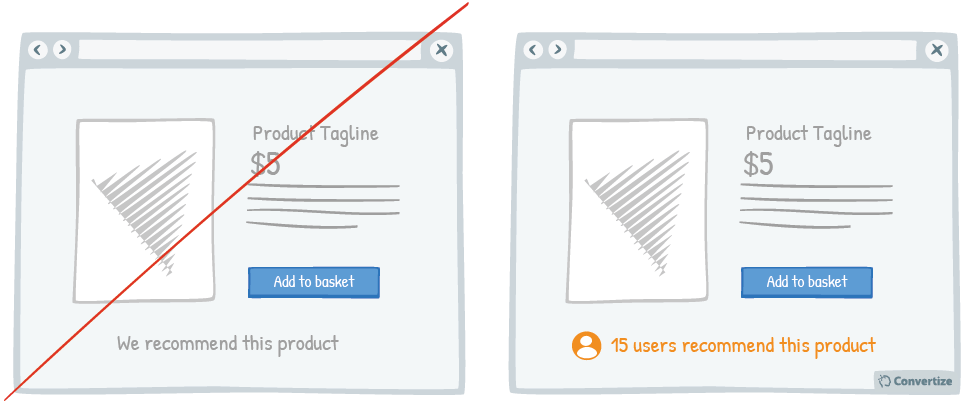
It is much more powerful to show visitors how many previous customers recommend your product rather than recommending it yourself. Saying “We recommend…” or “We advise…” will immediately set a commercial tone and will not inspire confidence. Instead, showing them that their peers have recommended a certain product or service will be more trustworthy and will have a greater impact.

People also feel inspired to carry out an action (like making a purchase) when they see proof that it has been done many times before, meaning there haven’t been any snags in the process and that they can confidently carry out these same actions themselves.
Principles
- Self-efficacy Theory (Bandura, 1984)
- Social Proof (Sherif, 1935; Asch, 1956)
#4 – Frame your products in the best light possible: “number 1”, “best selling”, “fastest growing”
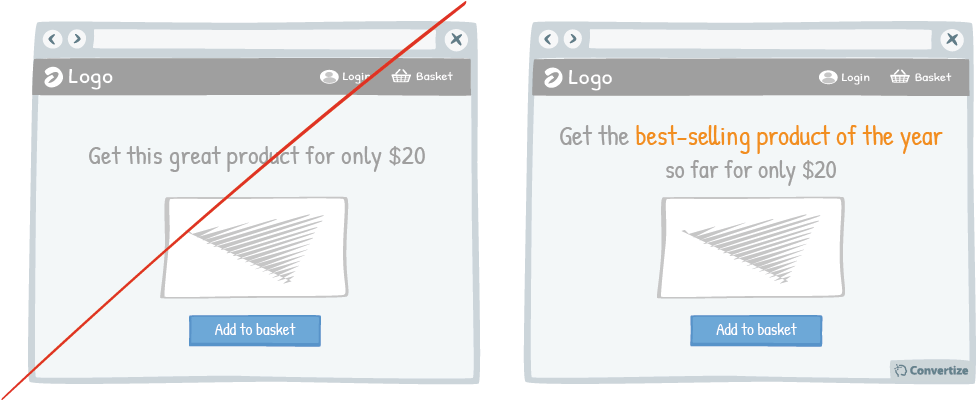
Presenting your product as the #1 (be that the best rated, best selling or fastest growing etc.) immediately gives your customers confidence and satisfaction with their purchase decision.
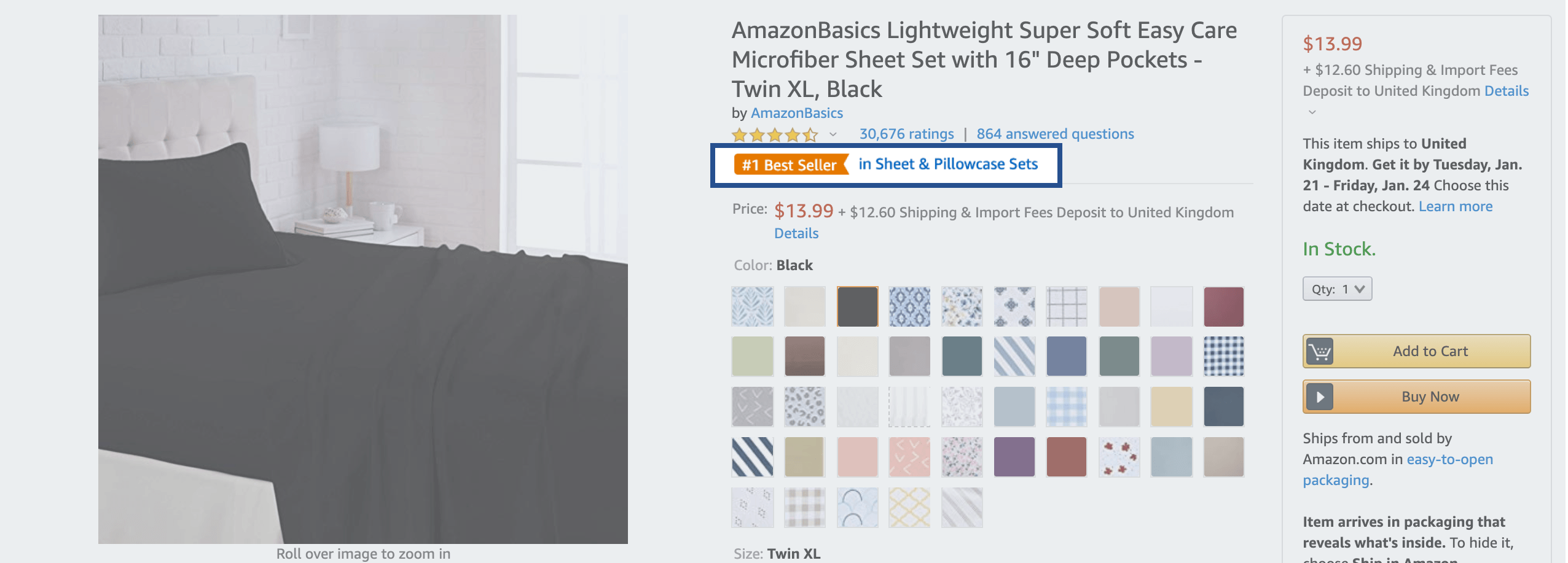
Principles
- Social Proof (Sherif, 1935; Asch, 1956)
#5 – Display the number of “likes” next to your product
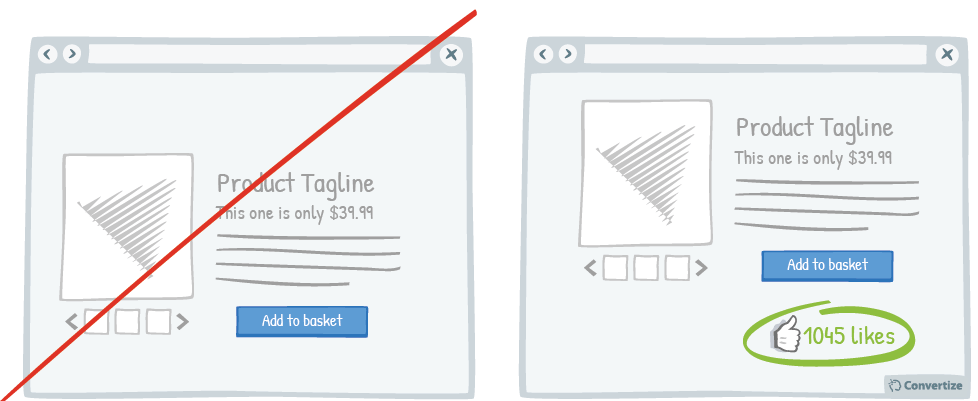
Displaying the number of people who have already “liked” your product is an effective persuasion tool.
This form of Social Proof taps in to our desire to follow in the behavioural footsteps of our peers and will automatically attach a positive bias towards a product.

It may also encourage your customers to “like” the product themselves which will augment your product’s visibility online.
Principles
- Social Proof (Sherif, 1935; Asch, 1956)
#6 – Recommend similar products: “People who browsed this product, also bought:”
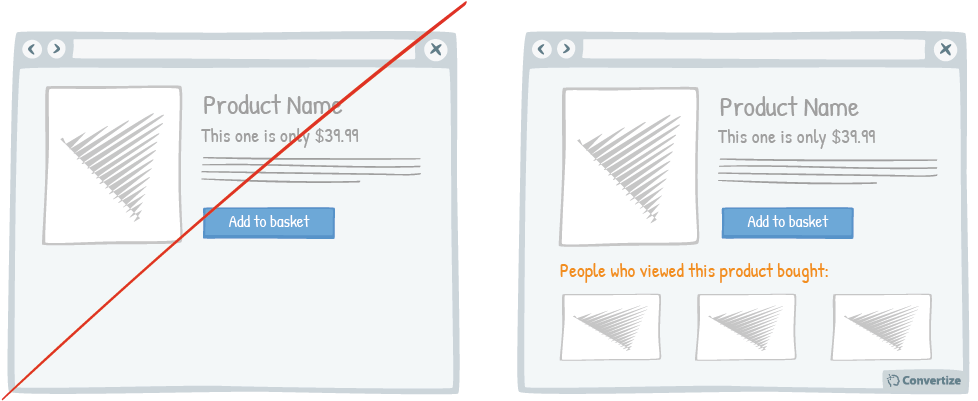
Adding a “People who viewed this product bought…” feature is an effective persuasion technique.
People can find a vast product selection overwhelming. Tailoring their choices by showing them what other, similar people have brought gives them fewer, but more specific, options.

Principles
- Social Proof (Sherif, 1935; Asch, 1956)
#7 – Display customer testimonials right under the product

If you have positive reviews about your products or services then make sure they are clearly displayed; showing this “social proof” from your customer’s peers is an effective persuasion technique.
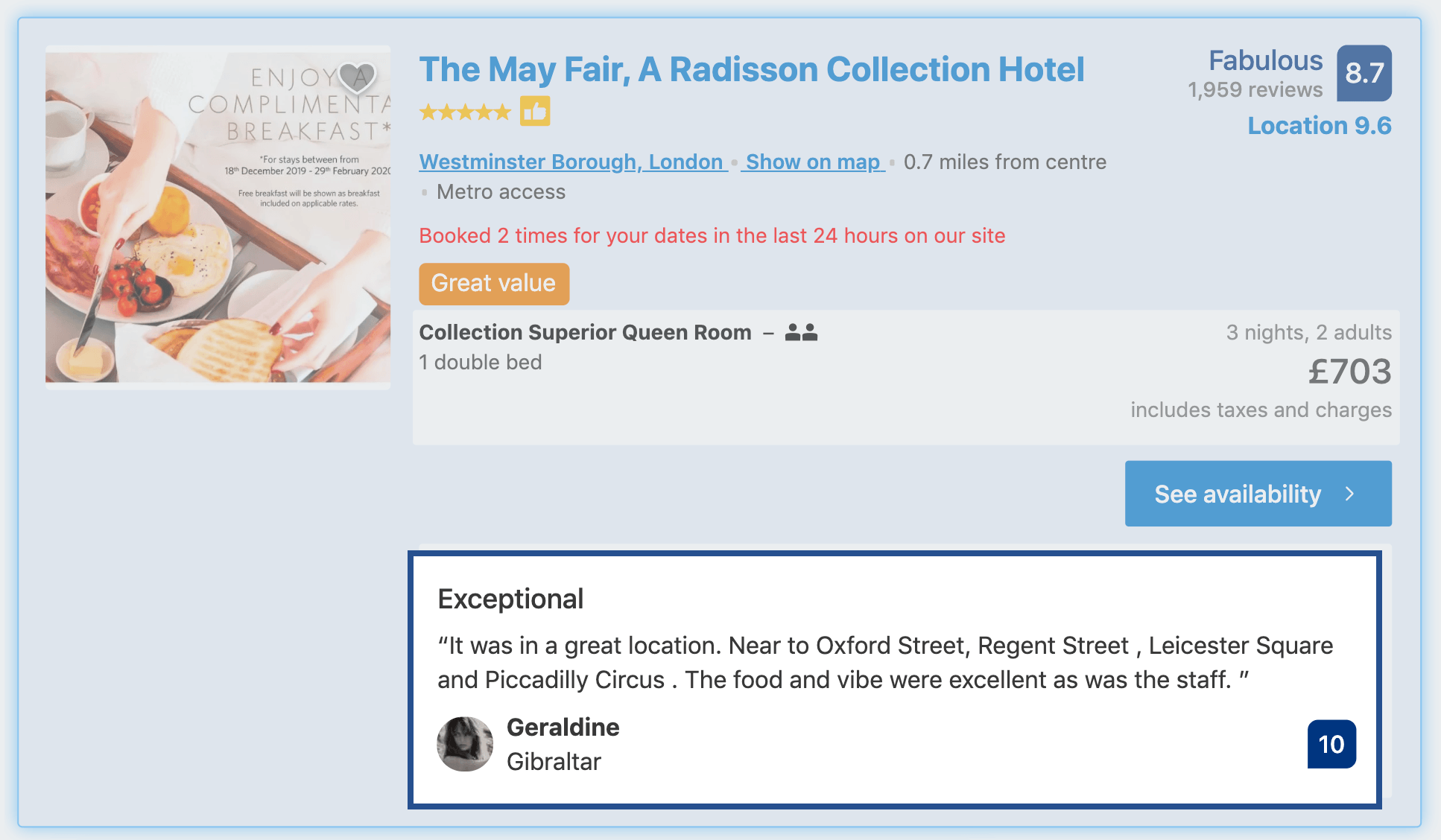
Principles
- Social Comparison Theory (Festinger, 1954; Thorton & Arrowood, 1966)
- Base rate fallacy (D. Kahneman)
#8 – Display expert reviews for your products’ endorsements
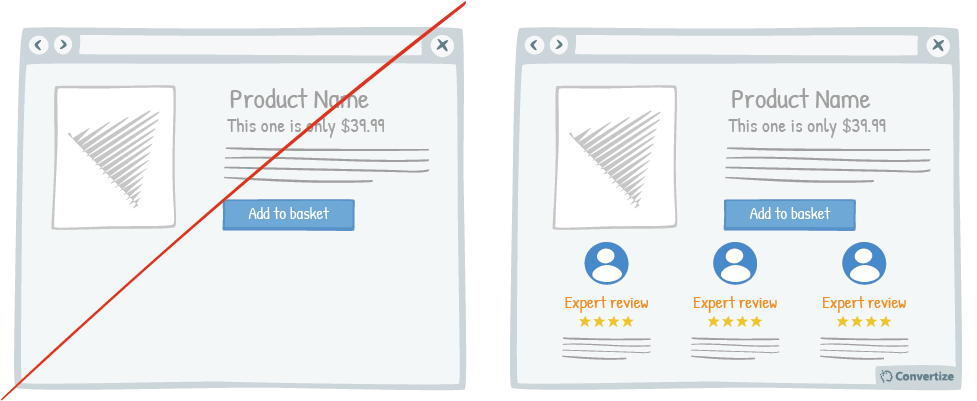
Displaying expert reviews is an effective way of endorsing your products. The positive feedback and opinions of customer’s peers is incredibly important as we often rely on this “social proof” in order to make decisions.

When it is an expert or someone who we expect or presume to be more knowledgeable than us their opinion holds even more weight and there is an increased likelihood that we will copy their actions and purchase the same items.
Principles
- Social Proof (Sherif, 1935; Asch, 1956)
#9 – If connected via Facebook, indicate how many friends have purchased or signed up
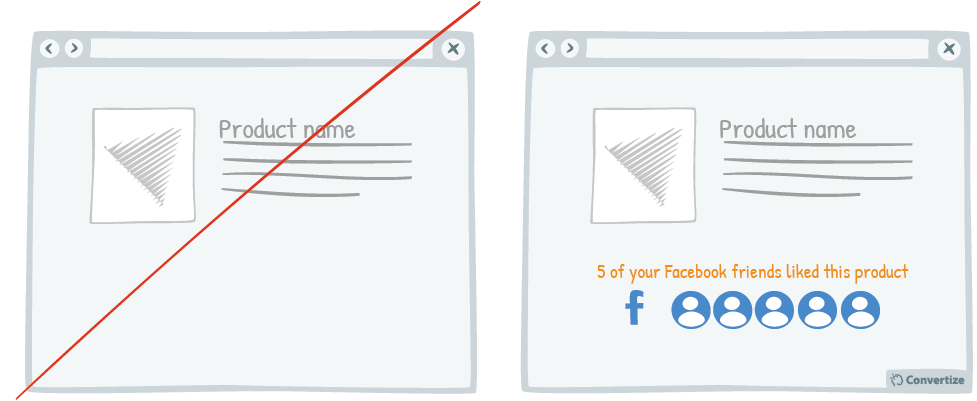
If you offer your customers the option to sign in using Facebook then make the most of this advantage. Indeed, using Facebook is a good way to quickly access data about a customer but that’s not the only benefit. You can also use it to help persuade them to make a purchase, by displaying those of their Facebook friends who have liked, used, talked about, or purchased the products from your site.
When we are unsure on which decision to make, studies show that we tend to imitate others’ behaviour – and none will be more persuasive than that of people we know. We will automatically think that if one of our friends purchased or liked a particular product, then it must be good. The product is given immediate credibility and extra desirability, which will influence conversion rate.
Principles
- Social Proof (Sherif, 1935; Asch, 1956)
- Mere-exposure Effect (Fechner, 1875; Zajonc, 1960)
Using Social Proof on eCommerce Category Pages
#10 – Mark your best products as “Popular Choice”
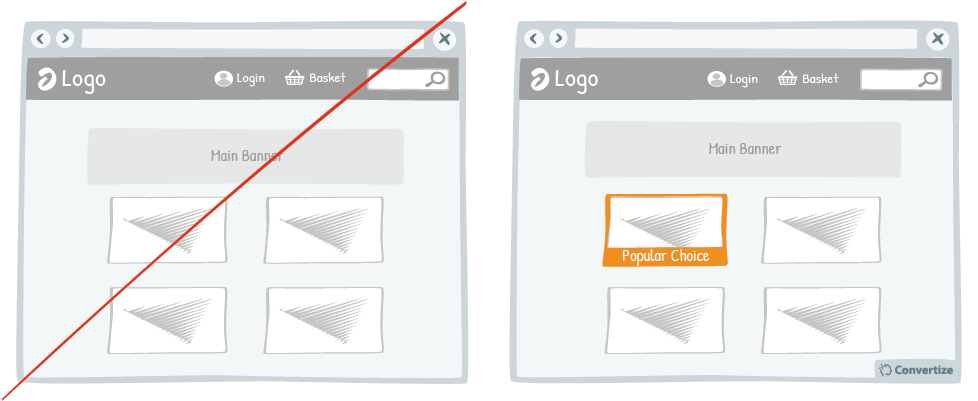
Marking your best products as a “Popular Choice” is an effective persuasion technique to encourage more people to make the same purchase.

Principles
- Social Proof (Sherif, 1935; Asch, 1956)
Tagging Products To Create Social Proof
#11 – Tag popular products to help your visitor make a decision
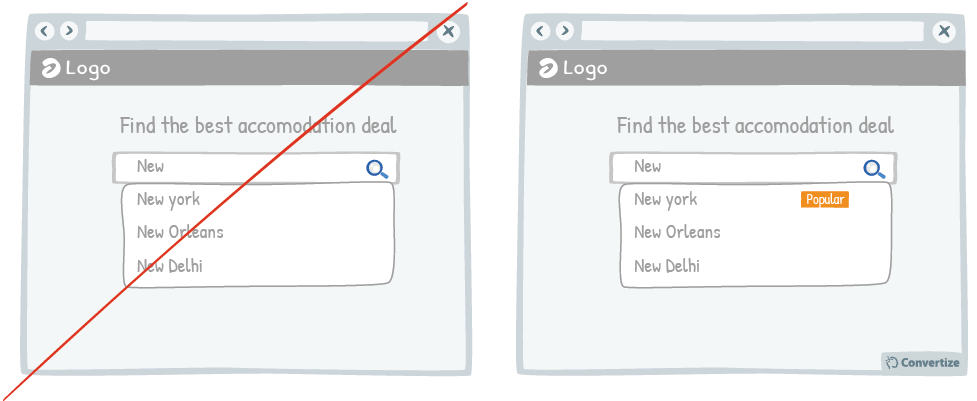
To help your visitors make a decision that they feel confident in (or to sway them towards a particular product or service) make it visually obvious which option is the most popular choice.
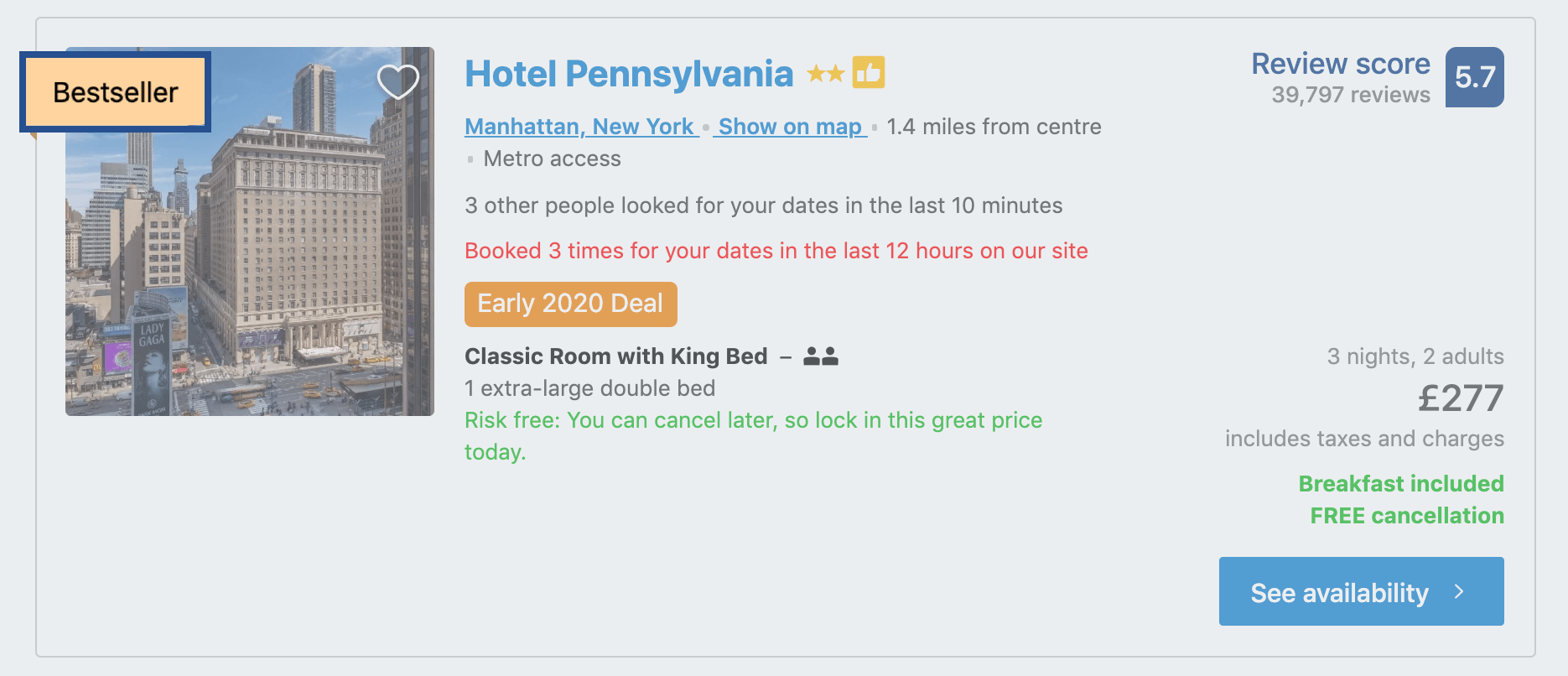
Your customer will certainly be influenced by knowing that a large number of other people have already made the same selection.
Principles
- Social Proof (Sherif, 1935; Asch, 1956)
Adding Social Proof to the Checkout Process
#12 – Re-engage customers after payment and show a message which indicates: “people who bought this, also bought: …”
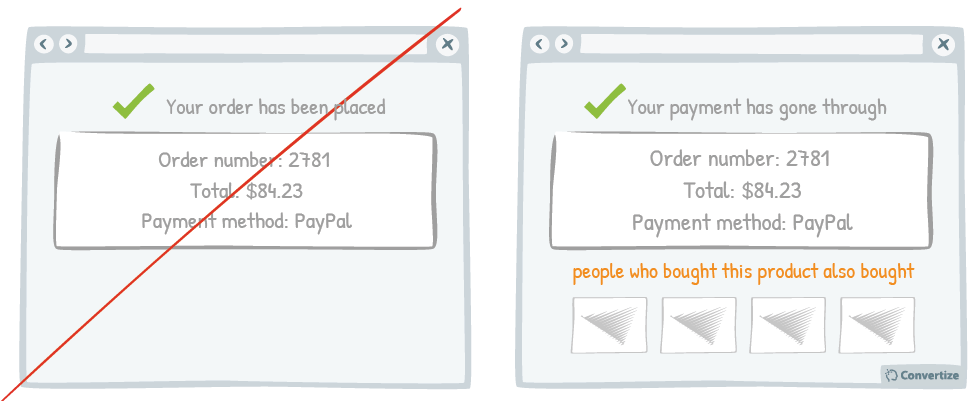
On the confirmation page after purchase, display “people who bought this product also bought …” This creates a double funnel.
The secondary funnel will encourage your customers to make another purchase after completing their first. Indeed, people are more likely to make the second purchase due to the Consistency principle; we like to stay consistent with our own actions.
We also tend to be swayed by the decisions of others and so showing visitors what other customers have purchased can be highly influential. Displaying this on the confirmation page means you can encourage them to make further purchases without having disturbed their intention to make the first purchase.

Even if the customer doesn’t make any of the additional suggested purchases immediately, it will still give them ideas of products to buy in the weeks or months ahead, increasing the average basket amount.
Principles
- Social Proof (Sherif, 1935; Asch, 1956)
- Commitment and Consistency (Cialdini, 1984)
Creating Social Proof With Effective Testimonials
#13 – Display contextual details (such as location) to allow users to identify with the reviewer
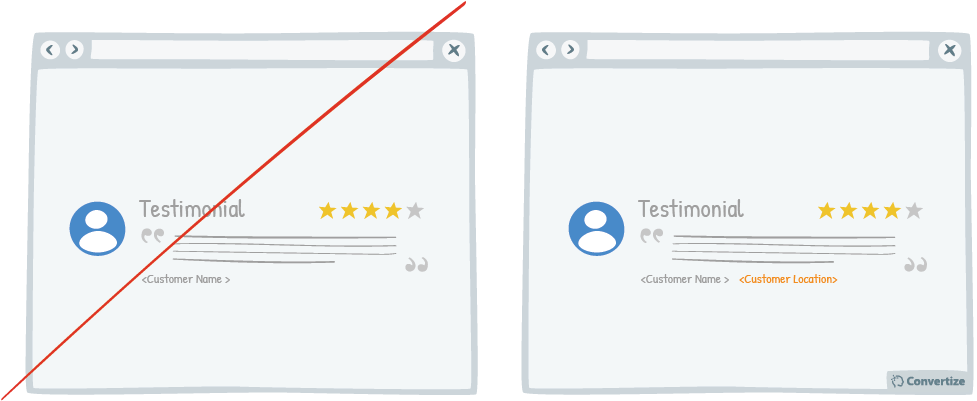
Featured testimonials will be more credible if your users can identify with the reviewers and view them as real people rather than just disconnected words on the screen.

Contextual details like location or name will help evoke an immediate connection from users and they will be more inclined to trust the reviews and therefore base their purchase decisions on them.
Principles
- Social Proof (Sherif, 1935; Asch, 1956)
- Social Cognition (Pelham; Carvallo & Jones, 2003)
#14 – Add human pictures to your testimonials
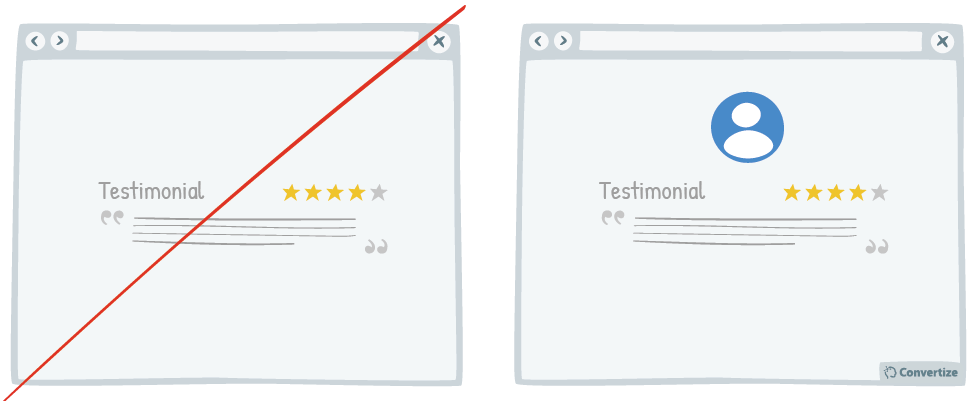
Adding human pictures to your testimonials will lend them extra credibility and lead users to place more trust in them.
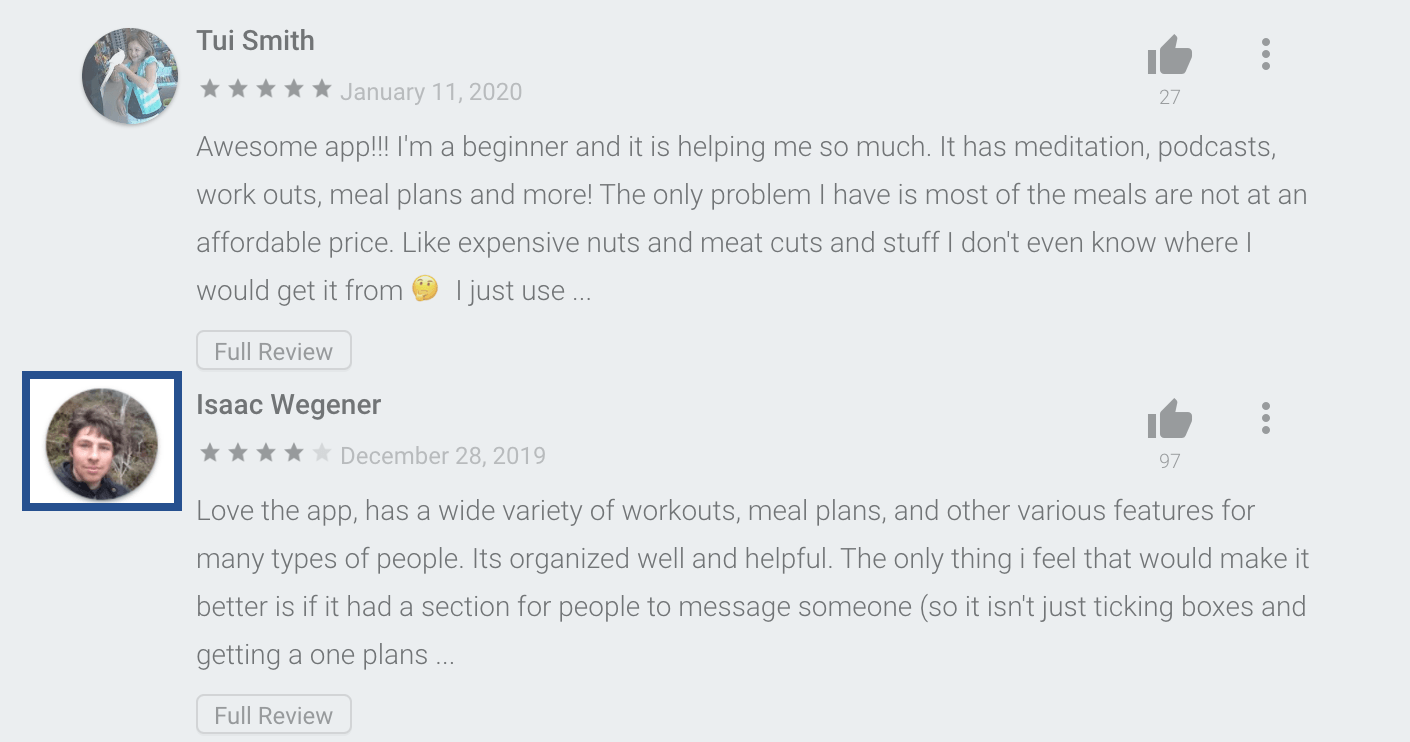
People are likely to connect more immediately with a visual image than simply with a name and seeing human pictures evokes emotional responses.
Principles
- Social Proof (Sherif, 1935; Asch, 1956)
Conclusion: How To Use Social Proof in eCommerce
eCommerce website design is a form of sales pitch. Muddle your words with a confusing advert or landing page, and your audience will lose interest. Get the pitch right, and your audience will become valued customers.
Social Proof is one of the most effective ways to build trust and interest in your products. By including customer reviews and testimonials on key pages, you can send your conversion rate through the roof.




Perhaps the most commonly used form of social proof is the customer testimonial. According to research done by Nielsen, 92% of people will trust a recommendation from a peer, and 70% of people will trust a recommendation from someone they don t even know.
Great statistics! Testimonials are definitely one of the most important parts of online marketing – mainly because customers know they can trust them.